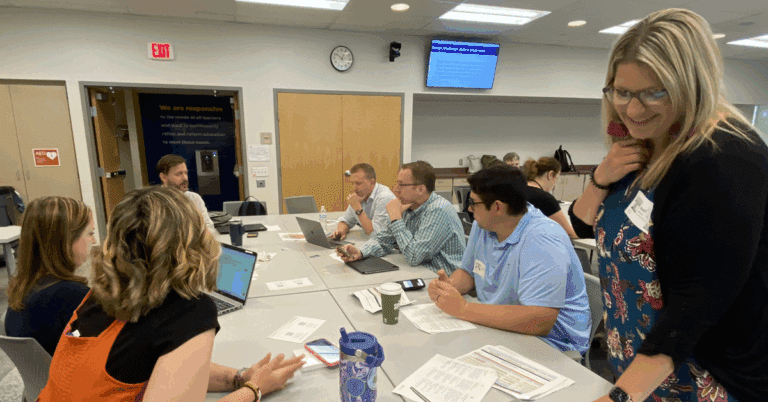Educator agency, or creating the conditions for teachers to exercise professional judgment, make instructional decisions and shape learning environments, is a cornerstone of effective, student-centered education. When educators are empowered and have access to the right data and supports, they can tailor instruction more effectively to meet the diverse needs of students, fostering environments where all learners can thrive.
Why does educator agency matter?
Empowered educators are pivotal in implementing personalized, competency-based learning and supporting student agency. By exercising agency, teachers can adapt curricula, employ innovative teaching strategies and respond to individual student progress. This flexibility not only enhances instructional effectiveness but also models lifelong learning for students.
Moreover, when educators have agency, they are more likely to feel valued and invested in their work, leading to increased job satisfaction and retention. This stability benefits students through sustained relationships and consistent instructional quality.
In Pennsylvania’s Butler Area School District, Superintendent Brian White recognized that traditional teacher evaluations were too mechanical, failing to inspire growth or innovation. To address this, the district revamped its evaluation process to align with personalized learning goals. “New teachers will be mentored by veteran teachers and have their professional development plans developed by those veteran teachers. They’ll be a part of professional learning communities focused on growing the skills we’ve identified that we need more of,” said White. “It’s not just about evaluation. It’s about setting your colleagues up for success.”
This approach not only empowers teachers to lead their own learning but also helps reduce turnover by fostering a supportive, growth-oriented culture.
How can district and school leaders support educator agency?
District leaders play a crucial role in cultivating educator agency. By establishing a shared vision for learning, promoting a culture of trust, fostering personalized learning communities (PLCs) and providing personalized professional development opportunities, leaders can create conditions where teacher autonomy is respected and encouraged.
PLCs and continuous quality improvement
PLCs allow educators to share best practices, reflect on their experiences and support one another in implementing student-centered approaches. Such collaborative environments reinforce teacher agency by valuing their insights and expertise.
These same environments create natural spaces for educators to engage in continuous quality improvement, focusing on learning, reflecting and adjusting. It is a mindset that values progress over perfection and embraces data as a tool for growth rather than judgment. With continuous improvement, data is not only collected; it is also utilized. Educators and learners engage in regular data conversations. Goals are co-created, progress is tracked transparently and feedback is welcomed as a catalyst for growth. Celebrations of improvement, both individual and collective, reinforce the value of learning from experience. When used in partnership with PLCs, educators can help one another learn from and share what works, and improve upon what doesn’t.
Personalized professional development
Just as we seek to personalize learning for students, educators must also experience professional development that is tailored to their needs, informed by their input and grounded in data to measure impact. High-quality professional learning should also reflect and embody the district’s shared vision, guiding principles and core beliefs and actively support the implementation of the strategic plan.
Building educator capacity requires more than one-time workshops. It involves ongoing cycles of improvement, reflection and support. Networking among educators and leaders through local professional communities and national networks fosters collaboration and shared learning. To build readiness for personalized, competency-based learning, professional development should include key components such as creating conditions for learner agency, utilizing competency-based progressions, implementing flexible pacing and sharing decision-making with learners. Because many educators have never experienced personalized learning themselves, engaging them in learning environments that mirror these approaches enables them to better understand the pedagogy and apply it more effectively in their classrooms.
How does educator agency benefit students?
When educators exercise agency, students reap the benefits. Teachers who can tailor instruction are better equipped to meet individual learning needs, making education more relevant and engaging. This personalized approach encourages student agency, as learners take ownership of their educational journeys.
Furthermore, schools that prioritize educator agency often see improvements in student outcomes. Empowered teachers are more likely to implement innovative practices that promote critical thinking, collaboration and problem-solving skills among students.
In essence, educator agency is not just about teacher empowerment; it’s about creating learning environments where both educators and students flourish. By supporting teacher autonomy, districts lay the groundwork for educational environments that are responsive, equitable and geared toward the holistic development of every learner.





